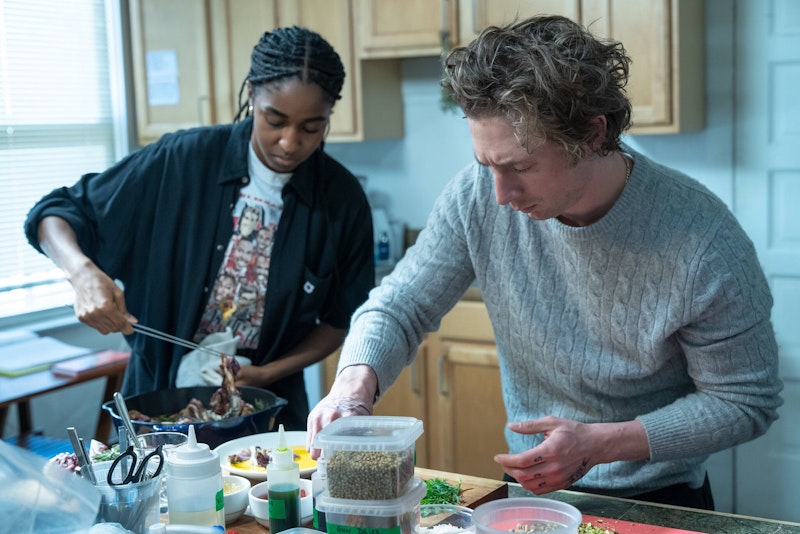Human beings can be chaos machines. Parents often spill their chaos onto their children. Children often spread their chaos onto other children. Bosses often spread their chaos onto employees, who spread that chaos amongst each other. Drivers often spread their chaos onto other drivers. And on and on. When people sit down at a table and eat, they’re usually hoping to take a moment away from the chaos. To settle themselves into a seat and fill their empty stomachs. Parents are just hoping their children stay at the table and eat. Don’t fight. Maybe take a few bites of a vegetable. For them, the chaos only settles after bedtime. The table is often an escape from the chaos, but what about the kitchen?
FX/Hulu’s The Bear has been nominated for 13 Emmy awards for the show’s eight-episode first season (released in June 2022). Season Two (June 2023) has earned even more universal acclaim. It’s a show about the frenetic intensity of the kitchen, the people who work together within that pressurized atmosphere, and the high-risk industry that a restaurant operates within. In the first season, the viewer’s thrown into the kitchen at “The Beef,” based closely on a River North Chicago landmark known as “Mr. Beef.” The show’s creator Christopher Storer grew up with the restaurant’s current owner, Chris Zucchero. Whereas countless restaurant-focused shows and movies have been dismissed as inauthentic, sloppy, and unconvincing depictions of kitchen chaos or life as a chef, The Bear is praised for its genuine portrayal of the culinary universe and the ways in which kitchens must operate as a team. One exception is the 1996 film Big Night.
Like any excellent show, the ensemble eventually becomes the star. The first season opens around Carmen “Carmy” Berzatto, the native son who returns to Chicago after a whirlwind culinary escapade through Copenhagen and New York City, where he made his mark on the fine-dining world. After the suicide of his brother, Michael, Carmy returns home to keep the restaurant afloat. Just as Carmy adjusts to his new situation—a dysfunctional kitchen where the workers are in constant conflict—the viewer must adjust to the sensory overload of the show.
Berzatto is played by Jeremy Allen White. The inner turmoil, punchy verve, and existential sadness in White’s face brings to mind both Sean Penn and Gene Wilder. Like Penn and Wilder, White’s pensive gaze can hold the silence. Alongside Carmy is Sydney Adamu, played by Ayo Edebiri, a comedian and actress whose youthful aura works well in contrast to the haggard and cranky kitchen vets. As Sydney is tasked with gaining their trust and respect, she and Carmen bond over their culinary creativity. We witness Carmy and Sydney as vibrant chefs, one seasoned and one aspiring, as they’re forced to navigate the storming seas of on-the-clock insanity.
Other memorable characters are Uncle Jimmy (Oliver Platt), Cousin Ritchie (Eben Moss-Bachrach) and Tina (Liza Colon-Zayas). Uncle Jimmy provides the necessary funds and occasional nugget of wisdom—with heavy consequences attached. Cousin Ritchie is the emotionally-crippled adult seeking validation and redemption. Tina’s the longtime kitchen veteran who wants more responsibility.
The show is equally comic and tragic. It’s closer to cinema verité than to a scripted sitcom. Each scene feels lived-in and realized, though the pacing and smash-cuts can distort that natural quality. The second season includes self-contained mini-films, as the narrative shifts to spotlight individual characters. Compared to the whirlwind volatility of saving a sandwich shop, the second season is about the process of building a fine-dining establishment. It’s also about redemption, trauma, and personal growth.
In this world, work can become a solution to the uncertainty and volatility of family life. The dysfunction, mania and addiction of the Berzatto family drive Carmy toward a hyper-focused, never-stop, militant desire for control and excellence in his work. Those who work in the restaurant world are well aware of the divide between the universe of the restaurant and personal life, which can become an afterthought.
As anyone who’s struggled with anxiety and depression knows, work is sometimes a way out of your own mind. A way to avoid one’s life by maintaining a focus elsewhere. The Bear also shows how becoming a member of a work family can alleviate the absence of connection one might feel in their own family. As the second season closes, Carmy finds himself unable to work and all the personal growth is called into question again.

